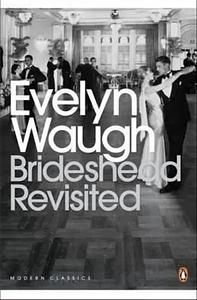Take a photo of a barcode or cover
To be honest i only read this because i heard that saltburn was loosely based on it. At the start you can imagine my disappointment when this was no where near as wild as that movie. This is obviously on me because this was made in the 40s so i don't know why i was expecting anything different. At the start i wasnt very interested in what was happening as it seems the author has a lot of interest in the behaviors of the upper class and Catholicism which i dont have any interest in. I found myself enjoying it more towards the end but definitely felt the ending to be a bit weak. I think i would enjoy this more on a second read.
the writing was beautiful but i had no idea this book was so… catholic. it had me in the first half. 3.5.
slow-paced
Plot or Character Driven:
Character
Strong character development:
Yes
Loveable characters:
No
Diverse cast of characters:
No
Flaws of characters a main focus:
Yes
This book was good, but for something which everyone described as “lush” and “evocative”, it was not lush or evocative enough. I was let down somewhat by the descriptions.
That said, the character development is excellent, I was never bored, and would highly recommend if only to wonder about faith and how different people respond and react to it. Very well written overall, but I wonder about the marketing and would most likely have rated it higher if it had been presented to me in a different way.
That said, the character development is excellent, I was never bored, and would highly recommend if only to wonder about faith and how different people respond and react to it. Very well written overall, but I wonder about the marketing and would most likely have rated it higher if it had been presented to me in a different way.
This for me, may very well be THE book, if not it's in the top pantheon of my Mount Bookmore. A wonderful elegant wistful glimpse of a world on which the sun is setting - fair makes me want to dress overly well in Oxford and dine and drink with the bright young things. Very very funny in parts especially the dinner scenes between Charles and his father. The way in which relationships and friendships are explored is timeless: we are all in some way Charles Ryder with our own Sebastian Flytes, a thread twitching on for e'er more.
Re-read note - Look it's Brideshead Revisited alright, it still remains one of my gold standards of how books should feel, the written equivalent of Bach's cello suites or similar. Also on a re-read the more I appreciate Anthony Blanche, he sees everything for exactly what's going on and nails Sebastian bang on, whilst never pretending to be anything he's not. Et in Arcadia ego or not.
2nd re-read: Yeah, still everything, be off with you Carruthers and take that bathwater with you. Prose so exquisite it would make a fine three bespoke piece suite and so much character it drips off the words on to the page.
Re-read note - Look it's Brideshead Revisited alright, it still remains one of my gold standards of how books should feel, the written equivalent of Bach's cello suites or similar. Also on a re-read the more I appreciate Anthony Blanche, he sees everything for exactly what's going on and nails Sebastian bang on, whilst never pretending to be anything he's not. Et in Arcadia ego or not.
2nd re-read: Yeah, still everything, be off with you Carruthers and take that bathwater with you. Prose so exquisite it would make a fine three bespoke piece suite and so much character it drips off the words on to the page.
challenging
reflective
slow-paced
Plot or Character Driven:
Character
Strong character development:
No
Loveable characters:
No
Diverse cast of characters:
No
Flaws of characters a main focus:
Yes
Don't know why I just got around to this, after all these years, but I'm glad I did. It was more thought provoking than I'd expected.
I'm a bit conflicted about this book. Overall, it was an enjoyable read - there were some quirky characters and part of the plot was a commentary on religion, which is a theme I don't at all mind. But it didn't really have a really climactic point - it just seemed to sort of end and I felt there could've been more. I mainly picked it up because I know the miniseries is well-regarded. I finally grew curious enough to look into it and prefer reading books before watching adaptations.
"Oh dear," said Julia, "where can we hide in fair weather, we orphans of the storm?"
I feel insane to have liked this novel as much as I did. Especially when it seems several people found it an absolute chore to read. I, myself, found it initially an absolute chore to read. Especially after that absolutely God-awful chapter two rant on the whole Flyte unit that one needs to grit their teeth through and bear with.
So why did I find myself liking it? There is something fascinating about seeing the fragile lives of Old Money people. It feels like gazing through a gilded glass cabinet at fine china, staring at its stillness, its stubborn preservation. Meanwhile, the world moves on from it. Sebastian, in particular, is a fascinating character in his juvenile avoidance of being a participant in the adult world; his attachment to his nanny and his teddy bear juxtaposed against his drinking, insulates him from responsibilities.
There were certainly times in the beginning when I felt like I was reading such a privileged lifestyle that it felt like it had no relevance to the world today. But, taking a step back, there are still some curious connections to a naivety that is lost in the presence of war, hardship, and progress. Of course, there is the whole issue of class and exploration of Catholicism as well.
Overall, would I suggest this novel to a person? No, I really wouldn't. I don't think many will honestly enjoy this. But I did.
I feel insane to have liked this novel as much as I did. Especially when it seems several people found it an absolute chore to read. I, myself, found it initially an absolute chore to read. Especially after that absolutely God-awful chapter two rant on the whole Flyte unit that one needs to grit their teeth through and bear with.
So why did I find myself liking it? There is something fascinating about seeing the fragile lives of Old Money people. It feels like gazing through a gilded glass cabinet at fine china, staring at its stillness, its stubborn preservation. Meanwhile, the world moves on from it. Sebastian, in particular, is a fascinating character in his juvenile avoidance of being a participant in the adult world; his attachment to his nanny and his teddy bear juxtaposed against his drinking, insulates him from responsibilities.
There were certainly times in the beginning when I felt like I was reading such a privileged lifestyle that it felt like it had no relevance to the world today. But, taking a step back, there are still some curious connections to a naivety that is lost in the presence of war, hardship, and progress. Of course, there is the whole issue of class and exploration of Catholicism as well.
Overall, would I suggest this novel to a person? No, I really wouldn't. I don't think many will honestly enjoy this. But I did.



